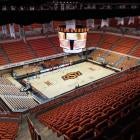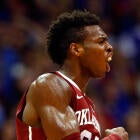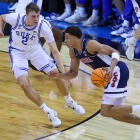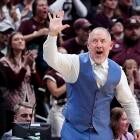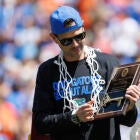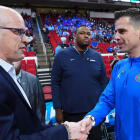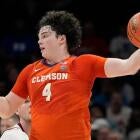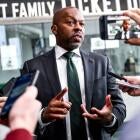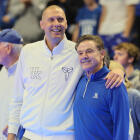The NCAA's Committee on Infractions made its intentions loud and clear Friday: it punished Oklahoma State's men's basketball program with a postseason ban for the 2020-21 season. Oklahoma State is the first program to be served with sanctions as a result of the FBI's probe into college basketball recruiting.
The news came as a shock to the program, which was not anticipating something so overwhelming. The school strongly disagreed with the NCAA's punishment and will appeal the decision.
Oklahoma State's statement on the NCAA findings. pic.twitter.com/fa52sB41BP
— OSU Cowboy Basketball (@OSUMBB) June 5, 2020
"I find it almost impossible to reconcile the severe penalties imposed by the NCAA for the violations detailed in today's report," Oklahoma State athletic director Mike Holder said.
Among other lesser penalties, Oklahoma State will be put on three years worth of probation, lose three scholarships between now and 2022-23, and will pay a $10,000 fine plus 1% of the men's basketball program's budget. The full set of sanctions (see below) stem from a Level I unethical conduct charge against former Cowboys associate head coach Lamont Evans, who was one of 10 men charged in September 2017 in the federal government's investigation that led to Evans ultimately serving three months in prison in the summer of 2019.
Evans, who did not cooperate with NCAA investigators, was given a 10-year show-cause.
Oklahoma State coach Mike Boynton was never charged or attached to the case. During a Zoom call with the media on Friday, Boynton expressed his displeasure.
"I sit here extremely frustrated, really disappointed for this program but most importantly for the players in our program, many of which weren't a part of our program when this began and have absolutely very minimal knowledge of anything that even happened in this case," Boynton said. "I feel badly for them and I certainly hope that through the appeals process we can understand more how terribly impactful this can be to their careers and to their futures."
What are the impacts of Oklahoma State's NCAA penalties? Listen below for a special Emergency edition of the Eye on College Basketball podcast and subscribe to the Eye on College Basketball podcast where we take you beyond the hardwood with insider information and instant reactions.
Boynton later added: "A postseason ban for a bunch of kids that were 15, 16 years old when a lot of this was going on? It's completely, completely out of bounds."
The 38-year-old Boynton took over the program in the spring of 2017 after previously being an assistant for one season at OSU alongside Evans. They were both hired by former Oklahoma State coach Brad Underwood. (Underwood, now Illinois' coach, was not mentioned/charged in the case.)
Evans was accused of unethical conduct after federal wiretaps and undercover videos caught him engaging in schemes to recruit players to schools he was employed by. But Oklahoma State was never found to have enrolled a recruit through illegal means, a key point the school will use in its appeal. For Evans, the endgame was to link prospects up with then-runner Christian Dawkins' sports agency, which was unknowingly being funded by the FBI in order to prove the government's case of bribery and fraud.
Evans was caught doing this while at South Carolina and at Oklahoma State. He was involved in an impermissible payment to former Oklahoma State player Jeffrey Carroll, who subsequently was suspended for three games. Evans pled guilty in January 2019 to his charges, which included accepting at least $18,150 dollars -- and potentially as much as $46,000 -- in bribe money.
On an NCAA call Friday with the media, COI member Larry Parkinson clarified that every fact of this case, as it pertained to Evans and was applied to Oklahoma State, was only in the purview of Evans' time at OSU, which lasted from the spring of 2016 until September 2017. All evidence and wiretaps put forth in the federal trial that uncovered Evans' rule-breaking behavior at South Carolina did not play into Oklahoma State's sanctions.
It remains to be seen if Evans' transgressions while at South Carolina will lead to significant sanctions on that program.
Parkinson went so far as to say that Oklahoma State helped itself in the case by working hand-in-hand with the NCAA in many areas.
"If they had not, maybe the result would have been different, but they fully cooperated and got the benefit of that," Parkinson said.
Holder said the school's appeal process will start immediately. He also is on alert to see how other programs are punished.
"All of us with the NCAA will be watching to see if these standards and expectations are applied consistently," he said.
That's a clear allusion to Kansas, LSU, Arizona, Creighton, Auburn, USC and more, all of which were entangled in the broader morass of the FBI's investigation and are awaiting judgment from either the COI or the newly formed Independent Accountability Resolution Process.
NC State has been confirmed to be going through the IARP process -- which does not allow for appeals -- while Kansas is expected to be next in terms of whether it will be slotted into the COI process or if it will be afforded the choice to meet with the IARP body.
OSU's appeal will almost certainly last at least through the summer, but Holder said Friday he has no concept or timeline as to whether this appeal can be pushed so far back as to not affect the 2020-21 season. That's relevant because the postseason ban is potentially devastating for Oklahoma State in this regard: the school has long since received a written commitment from Cade Cunningham, the No. 1 prospect in the Class of 2020. It remains to be seen whether or not this ruling will have an impact on Cunningham's future with the school. He could ultimately opt to leave and play at another school or pursue the G League's Pathway Program.
"Whatever the best option is for him we're going to support 100% without any reservations," Boynton said.
Here is the list of penalties handed down by the NCAA:
- Three years of probation.
- A 2020-21 postseason ban for the men's basketball team.
- A $10,000 fine plus 1% of the men's basketball program budget (self-imposed by the university).
- A reduction of men's basketball scholarships by a total of three during the 2020-21 through 2022-23 academic years.
- A reduction of men's basketball official visits to 25 during the 2018-19/2019-20 rolling two-year period and to 18 during the 2019-20/2020-21 rolling two-year period (self-imposed by the university).
- A prohibition of men's basketball unofficial visits for two weeks during the fall of 2020 and two weeks during the fall of 2021 (self-imposed by the university). The university also must prohibit unofficial visits for three additional weeks during the fall of 2020, 2021 and/or 2022.
- A prohibition of men's basketball telephone recruiting for a one-week period during the 2020-21 academic year (self-imposed by the university). The university also must prohibit telephone recruiting for six additional weeks during the probation period.
- A reduction in the number of men's basketball recruiting person days by 12 during the 2019-20 academic year (self-imposed by the university). The university also must reduce the number of recruiting person days by five during the 2020-21 academic year.
- A 10-year show-cause order for the former associate head coach. During that period, any NCAA member school employing him must restrict him from any athletically related duties unless it shows cause why the restrictions should not apply.
- A prohibition of the men's basketball staff from participating in off-campus evaluations for three consecutive days during the summer evaluation periods in 2020 (self-imposed by the university).
![[object Object] Logo](https://sportshub.cbsistatic.com/i/2020/04/22/e9ceb731-8b3f-4c60-98fe-090ab66a2997/screen-shot-2020-04-22-at-11-04-56-am.png)








